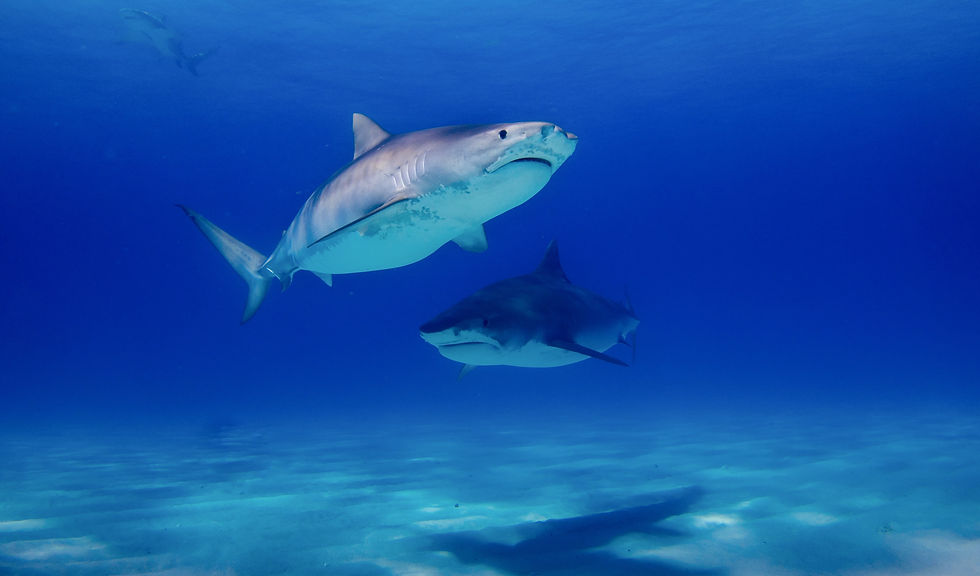SharkFluencer: YANNIS PAPASTAMTIOU
- Sphyrnas LLC

- Apr 30, 2020
- 4 min read
Updated: Dec 1, 2024
For this SHARKFLUENCER interview we've got the world's leading shark behavioural ecologists with work featured on NATGEO and BBC, Yannis Papastamatiou! Yannis works with new tag technologies that have advanced the field of predator ecology and led to evidence-based marine protected area zoning.
I grew up in London but used to spend each summer in Greece, most of which was spent snorkeling. That is where my love of the ocean started.

I don't remember when I started to appreciate sharks, but I know I was about 5 when I decided I wanted to study them! Jaws also played an important role as I really liked the marine biologist Hooper, and thought I could do the same.
"I have always wanted to be a marine scientist and am very fortunate in that regards. If you want to be a successful marine biologist, don't get too focused on just one animals or species."
Q.) What is your favorite shark diving memory and why?
It's difficult to answer that as I have been fortunate to dive with sharks all over the world. My absolute favorite dive was probably in the Fakarava channel (French Polynesia), diving with 300 naturally hunting grey reef sharks at night. We were studying the hunting behavior of these sharks, but seeing so much natural predation (especially at night), was something else.
Other favorites include diving with oceanic whitetip sharks (my favorite species) offshore in Hawaii and the Bahamas, diving with schooling hammerhead sharks in the Galapagos and Socorro Islands, and white sharks off Guadalupe Island, Mexico.
Q.) What is a 'predator ecologist'?

There could be several ways to define a predator ecologist, but for me it consists of studying the animals that are quite high up, or at the top of their respective foodwebs. My interests lie in understanding what role predators may have on the ecosystem, which factors regulate predator population sizes, and how are predators adapted to their environment.
There are many tools that can be used but I have focused on using electronic tags to study the movements, behavior, and physiology of sharks in captivity or in the wild. Defining an end goal is difficult as there will never be one! With science you very rarely reach a point where you say "ok I get it now, I have no more questions'. You answer one question and it generates 10 new ones!
Q:) Have you noticed a positive change in how people view sharks?
Yes, I have. I started studying sharks about 20 years ago and public support for sharks was fairly small and concentrated to a few groups. Now there are shark documentaries on TV (of varying quality) every day, shark conservation floods social media, and sharks have supporters at some of the higher levels of goverment. So there is far more support for sharks than there was 20 years ago, and far less of an opinion that sharks are killers out to get you.
Now on the flip side, I am seeing an increase in the opinion that sharks are harmless and similar to pets. They aren't, they are wild predators and capable of causing great harm (some species anyway) and should be treated with respect. So it is a compromise; they obviously are not out to get us, shark bites are extremely rare, and they are still wild predators and not remotely similar to pets.
Q:) Did you always want to be a marine scientist or did you change your mind along the way? What makes a successful shark scientist/marine biologist?

There are very few jobs in academia for 'shark scientists'. It's important to think broader, even if you mostly work with sharks. It is also important to know that the majority of a scientists career is still spent behind a desk analyzing data, writing manuscripts and grants etc.
There are other careers where you can spend more time in the water with sharks (e.g. diving instructors). If you do want to be a successful marine biologist, it's really important you develop good skills in mathematics, statistics, modelling etc. so learn as much as you can in those fields. They will benefit your career no matter which branch of science you go into!
Q:) What’s your proudest moment or greatest accomplishment in regard to sharks or ocean conservation?

Tiger sharks lead somewhat complicated lives. After two decades of research in Hawaii, we had learnt a lot, but the overall pattern of tiger shark migrations was still very unclear. They don't have nice clear migration patterns like white sharks, where all the sharks (or most of) leave at a certain time of year and return at another.
However, we then combined all the data we had, including the movements of 100 tiger sharks, with some individuals tracked over four years, and analyzed the data using some sophisticated statistical tools (at the time). Then the pattern emerged! There is still a lot we dont know, but I feel we really advanced our understanding of tiger sharks and shark movements in general with that work.
Q:) Have you found success in handling people that don’t understand or agree with conservation efforts?
I think it's important to consider the endgame of conservation, which is to make sure that shark populations (or fish in general) are sustainable and not at risk of going extinct. The goal of conservation should not be to make everyone have the same opinions as you or beliefs. You may not eat fish, but plenty of people do and rely on fishing for their lives. So, I believe that a mentality of compromise can lead to more effective conservation in the end. The vast majority who fish, do not want to see populations wiped out either!




Comments